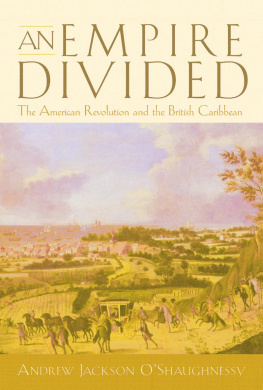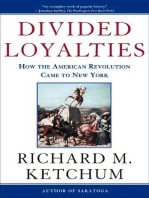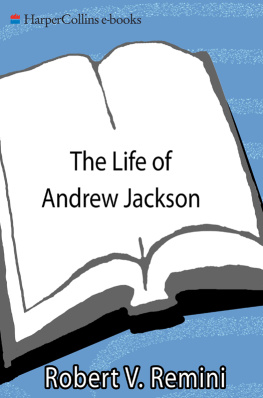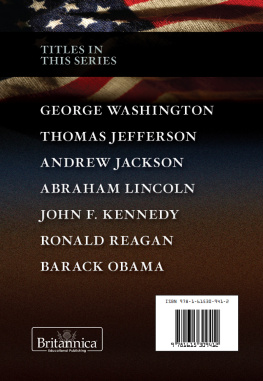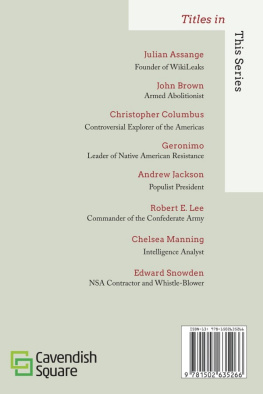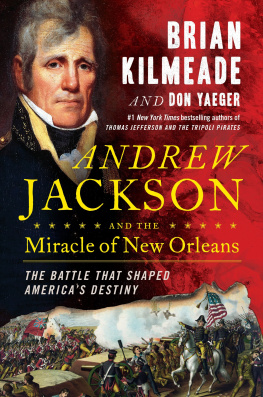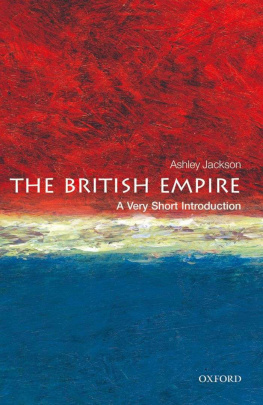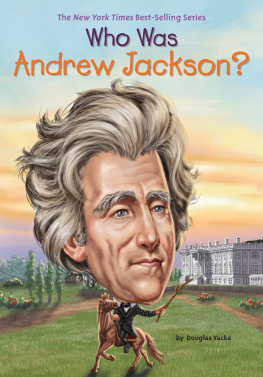Publication of this volume was assisted by a grant from
the McNeil Center for Early American Studies
Copyright 2000 University of Pennsylvania Press
All rights reserved
Printed in the United States of America on acid-free paper
10 9 8 7 6
Published by
University of Pennsylvania Press
Philadelphia, Pennsylvania 19104-4011
Library of Congress Cataloging-in-Publication Data
OShaughnessy, Andrew Jackson.
An empire divided : the American Revolution and the British Caribbean / Andrew Jackson OShaughnessy.
p. cm. (Early American studies)
Includes bibliographical references (p. ) and index.
ISBN 0-8122-3558-4 (alk. paper). ISBN 0-8122-1732-2 (pbk. : alk. paper)
1. West Indies, BritishHistory18th century. 2. United StatesHistoryRevolution, 17751783Influence. 3. Great BritainRelationsWest Indies, British. 4. West Indies, BritishRelationsGreat Britain. I. Title. II. Series.
F2131 .O74 2000
The West India approach bids fair entirely to reshape the
study of American history.
LOWELL J. RAGATZ,
The West Indian Approach to the
Study of American Colonial History
THE THIRTEEN COLONIES in North America represented only half the colonies of British America in 1776.
It may be argued that rebellion was impractical in the islands and that a comparison with the mainland colonies is therefore invalid. The British West Indies did not rebel in response to the Slave Emancipation Act of 1833 because obstacles to rebellion among the white island elites were as overwhelming then as they had been in 1776. However, there were other possible strategies of opposition, such as vigorous lobbying, pamphleteering, framing petitions, and forming associations. The planters employed such methods in opposition to the abolition of the slave trade but only after the American War. In contrast, they did not unite in even a limited campaign of opposition before the American Revolution. Unlike Bermuda, the British West Indies did not send delegates to the Continental Congress.
The study of the British West Indies is also important because they played a crucial role in the origins and the development of the American Revolution. They received special consideration from the imperial government because they were regarded as a major source of national wealth in Britain, and their importance to Britain affected colonial policy toward North America. Their passivity toward colonial reforms helped to divide colonial opposition and sent mixed signals to the imperial government, and the inactivity of their lobby in London contributed to the fatal isolation of the North American lobby. The study of the islands offers a very different perspective of the problems that faced imperial statesmen and military strategists who were responsible for some twenty-six colonies at the beginning of the American Revolution.
Furthermore, the defense of the West Indies contributed to the British defeat in the American Revolutionary War. Sir John Fortescue, in his epic history of the British army, wrote that the part played by the West Indian islands during the American War of Independence has been so little appreciated as to demand particular attention. Piers Mackesy, in what is still the most comprehensive study of the British war for America, concluded that the American War had been largely fought and decided in the West Indies. Barbara Tuchmans The First Salute (1988) refers to the first foreign salute of the American flag, which occurred in the Caribbean in 1776. The overriding importance the West Indies held in British thinking is a major theme of her book.
Finally, the division of British America after the American Revolution had major implications for both the West Indies and the United States. The islands and mainland colonies were previously part of the same polity, which was artificially severed by the American War. Their trade was officially restricted after the war, resulting in less interaction. The exile of black American loyalists from the United States played an influential role in the spread of Afro-Christianity in the British West Indies. The division also helped the cause of abolitionists in both Britain and the United States: it more than halved the number of slaves in the British Empire; made slavery appear virtually peculiar to the South within the United States; and prevented the island and southern planters from forming a common lobby against the abolitionists. The failure of the British West Indies to join the American Revolution therefore had significance for the history of slavery in the West Indies and the United States.

My book aims to redress the omission of the British West Indies from the scholarship of the American Revolution. Historians have long acknowledged their importance for understanding the colonial history of the United States, but this perspective has not affected the treatment of the American Revolution. In the late nineteenth and early twentieth centuries, Charles McLean Andrews pioneered an approach to the early political history of the United
Andrews inspired Frank Wesley Pitman and the imperial school of historians who were active before World War II and who were impressed by the significance of the West Indies in the development and also in the disruption of the old British empire. Leonard W. Labaree was emphatic that anyone who fails to include the West Indies in the political growth of the colonies cannot fully explain the development of British governmental policies towards the continental colonies and the resulting social unrest. Lowell Ragatz also argued that the shaping of imperial policies to serve [the] sectional ends [of the West Indies] paved the way for revolution.
The imperial historians were virtually eclipsed in the nationalistic and introspective climate of the cold war. However, the emphasis on the importance of the British West Indies for the study of early America has been revived among historians who have adopted an Atlantic approach in their research on British America, including Richard Dunn, Jack Greene, Richard Sheridan, John McCusker, Stanley Engerman, David Barry Gaspar, Trevor Burnard, Philip Morgan, David Hancock, Alison Games, David Shields, and Michael Mullin. This approach is now sufficiently well established to be incorporated into a new generation of college textbooks on the history of the United States.
Nevertheless, the British West Indies have received scant attention in the historical literature on the American Revolution. The imperial school dealt with the subject only tangentially. Pitman ended his major work in 1763. Ragatz was exclusively concerned with economic developments in the era of the American Revolution as a prelude to his thesis about the decline of the British West Indies before 1833. It was an obvious subject for Lawrence Henry Gipson, whose magisterial fifteen-volume history The British Empire Before the American Revolution



